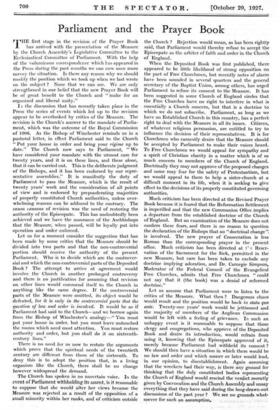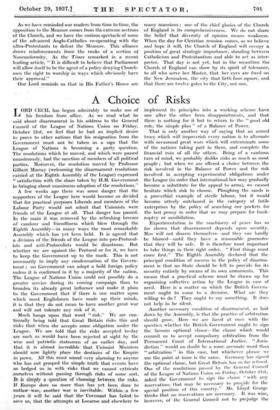Parliament and the Prayer Book
THE first stage in the revision of the Prayer Book has arrived with the presentation of the Measure by the Church Assembly's Legislative Committee to the Ecclesiastical Committee of Parliament. With the help of the voluminous correspondence which has appeared in the Press during the, past months we can now once more survey the situation. Is there any reason why we should modify the position which we took up when we last wrote on the subject ? None that we can see. We are only strengthened in our belief that the new Prayer Book will be of great benefit to the Church and " make for an organized and liberal unity."
In the discussion that has recently taken place in the Press the series of events which led up to the revision appear to be overlooked by critics of the Measure. The revision is the Church's answer to the mandate of Parlia- ment, which was the outcome of the Royal Commission of 1906. As the Bishop of Winchester reminds us in a pastoral letter, in effect Parliament said to the Church " Put your house in order and bring your regime up to date." The Church now says to Parliament, " We have considered your mandate with the utmost care for twenty years, and it is on these lines, and these alone, that it can be carried out. This is the deliberate judgment of the Bishops, and it has been endorsed by our repre- sentative assemblies." It is manifestly the duty of Parliament to pass the Measure, which is the result of twenty years' work and the consideration of all points of view and is endorsed by preponderating majorities of properly constituted Church authorities, unless over- whelming reasons can be adduced' to the contrary. The causa cav,sans of revision was the need of restoring the authority of the Episcopate. This has undoubtedly been achieved and we have the assurance of the Archbishops that the Measure, when passed, will be loyally put into operation and order enforced.
Let us for a moment consider the suggestion that has been made by some critics that the Measure should be divided into two parts and that the non-controversial portion should receive the authority of the present Parliament. Who is to decide which are the controver- sial and which the non-controversial parts of the Deposited Book ? The attempt to arrive at agreement would involve the Church in another prolonged controversy and there is no justification for assuming that revision on other lines would commend itself to the Church in anything like the same degree. If the controversial parts of the Measure were omitted, its object would be defeated, for it is only in the controversial parts that the question of law and order is involved. It would be as if Parliament had said to the Church—and we borrow again from the Bishop of Winchester's analogy—" You must put your house in order, but you must leave untouched the rooms which need most attention. You must restore authority and order, but you shall do it on sixteenth- century lines."
There is no need_ for us now to restate the arguments which prove that the spiritual needs of the twentieth century are different from those of the sixteenth.. To deny this is to adopt the position that, in a living organism like the Church, there shall be no change however widespread the demand.
The- Church has spoken in no uncertain voice. In the event of Parliament withholding its assent, is it reasonable to suppose that she would alter her views because. the Measure was rejected as a result of the opposition of a small minority within her ranks, and of criticism outside the Church ? Rejection would mean, as has been rightly said, that Parliament would thereby refuse to accept the Episcopate as the arbiter of faith and order in the Chureh of England.
When the Deposited Book was first published, there appeared to be little likelihood of strong opposition on the part of Free Churchmen, but recently notes of alarm have been sounded in several quarters and the general secretary of the Baptist Union, among others, has urged Parliament to refuse its consent to the Measure. It has been suggested in some Church of England circles that the Free Churches have no right to interfere in what is essentially a Church concern, but that is a doctrine to which we do not subscribe. Parliament, as long as we have an Established Church in this country, has a perfect right to deal with the Measure in all its issues. Citizens, of whatever religious persuasion, are entitled to try to influence the decision of their representatives. It is for Churchmen who earnestly desire that the Measure should be accepted by Parliament to make their voices heard. To Free Churchmen we would appeal for sympathy and a spirit of Christian charity in a matter which is of so much concern to members of the Church of England.
Doctrinally they may not approve of the proposed changes and some may fear for the safety of Protestantism, but we would appeal to them to help a sister-church at a difficult moment in its life, when it is seeking to give effect to the decisions of its properly constituted governing authorities.
Much criticism has been directed at the Revised Prayer Book because it is feared that the Reformation Settlement is imperilled and that the new Communion Office implies a departure from the established doctrine of the Church of England. But an examination of the Measure does not confirm these fears, and there is no reason to question the declaration of the Bishops that no "doctrinal change "% is involved. The new prayer of Consecration is less Roman than the corresponding prayer in the present office. Much criticism has been directed at t''e Reser-, vation of the Sacrament for the Sick, permitted in the new Measure, but care has been taken to exclude any doctrine implying adoration, and Dr. Carnegie Simpson, Moderator of the Federal Council of the Evangelical Free Churches, admits that Free Churchmen could not say that it (the book) was a denial of reformed doctrine."
Let us assume that Parliament were to listen to the critics of the Measure. What then ? Dangerous chaos would result and the position would be back in statu quo ante. Twenty-one years' work would be jettisoned and the majority of members of the Anglican Communion would be left with a feeling of grievance. In such an unhappy event is it reasonable to suppose that those clergy and congregations, who apprOve of the Deposited Book and desire its introduction, would refrain from using it, knowing that the Episcopate approved of it, merely. because Parliament had -withheld its consent ?
We should then have a situation in which there would be no law and order and which sooner or later would lead, in our opinion, to disestablishment. Again assuming that the wreckers had their way, is there any ground for thinking that the duly constituted bodies representing the Church of England would rescind the verdict recently given by Convocation and the Church Assembly and unsay everything that they have said during the long-drawn-out discussions of the past year ? We see no grounds what- soever for such an assumption, As we have reminded our readers from time to-time, the opposition to the Measure comes from the extreme sections of the Church, and we have the curious spectacle of some of the advanced Anglo-Catholics co-operating with the ultra-Protestants to defeat the Measure. This alliance draws reinforcements from the ranks of a section of Nonconformity. As the Times remarked in a recent leading article, " It is difficult to believe that Parliament will allow itself to be the agent of a policy denying Church- men the right to worship in ways which obviously have their approval."
Our Lord reminds us that in His Father's House are many_ mansions ; one-of the chief glories of the Church of England is its comprehensiveness. We do not share the belief that diversity of opinion means weakness. When the day for Christian reunion comes, as we believe and hope it will, the Church of England will occupy a position of great strategic_ importance, standing between Catholicism and Protestantism and able to act as inter- preter. That day is not yet, but in the meantime the Church of England can show by its spirit of tolerance, to all who serve her Master, that her eyes are fixed on the New Jerusalem, the city that lieth four square, and that there are twelve gates to the City, not one.



























































 Previous page
Previous page